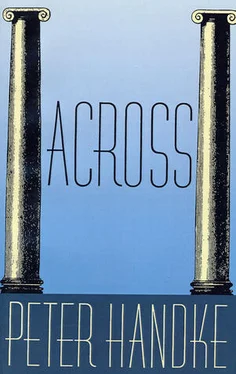Peter Handke - Across
Здесь есть возможность читать онлайн «Peter Handke - Across» весь текст электронной книги совершенно бесплатно (целиком полную версию без сокращений). В некоторых случаях можно слушать аудио, скачать через торрент в формате fb2 и присутствует краткое содержание. Год выпуска: 2000, Издательство: Farrar, Straus and Giroux, Жанр: Современная проза, на английском языке. Описание произведения, (предисловие) а так же отзывы посетителей доступны на портале библиотеки ЛибКат.
- Название:Across
- Автор:
- Издательство:Farrar, Straus and Giroux
- Жанр:
- Год:2000
- ISBN:нет данных
- Рейтинг книги:3 / 5. Голосов: 1
-
Избранное:Добавить в избранное
- Отзывы:
-
Ваша оценка:
- 60
- 1
- 2
- 3
- 4
- 5
Across: краткое содержание, описание и аннотация
Предлагаем к чтению аннотацию, описание, краткое содержание или предисловие (зависит от того, что написал сам автор книги «Across»). Если вы не нашли необходимую информацию о книге — напишите в комментариях, мы постараемся отыскать её.
Across — читать онлайн бесплатно полную книгу (весь текст) целиком
Ниже представлен текст книги, разбитый по страницам. Система сохранения места последней прочитанной страницы, позволяет с удобством читать онлайн бесплатно книгу «Across», без необходимости каждый раз заново искать на чём Вы остановились. Поставьте закладку, и сможете в любой момент перейти на страницу, на которой закончили чтение.
Интервал:
Закладка:
The Viewer Takes Action
The monthly tarok game was scheduled for the Wednesday of Holy Week. We meet somewhere in the Salzburg area, at the home of one of the players, who usually invites a fifth, so that each player in turn sits out a hand and merely looks on. (This fifth is often someone hitherto unknown to the others.) On this occasion, the game was to take place in a house on the Mönchsberg, situated, in a manner of speaking, at the bottom of the pass, over which the road, after rising from the plain, leads down to the courtyard of the Festival Theater, and thence to the Old City.
Ever since I was a child, playing cards — and not only the special tarok cards — have for me epitomized “country.” That would have been my answer if asked what I visualize when hearing the words “card game.” Country in every sense: open country, flat country, countrified country, small country (such as Andorra or San Marino), landlocked country, the country which, unlike the state, has no laws but only customs … And, for the adult, cards still have the same magic; they can at any time fit the parts of a country together for him into a whole country. Held fanwise on the four sides of the card table, they represent in my eyes the “heartland,” which, as the game proceeds, projects its colors, its smells, and its language beyond the limits of the room into the country round about. Even as a child, when I only watched, every game was for me a kind of circuit, which in the course of the play opened out into a spiral, etc., until the horizon, as I looked out the window, shared in the colors and symbols of the card country. The police siren outside was drawn in, as was the singing of the crazy man in the gateway of the cemetery. During the first card game I was allowed to take part in, a funeral procession came down the street. The feebleminded woman, who had sometimes let us youngsters look under her skirt, had died. The coffin was draped in white, in token of virginity. It was a day in early January; rain was falling; the trees were black-brown; molehills looked out from the yellowish snow. Yes, to me a card game means that country where I, in accordance with my ideal, can show my colors and pledge allegiance to them; above all, where I can be laconic. It needn’t absolutely be tarok; just that tarok is probably the most varied, or, as someone once said in the days when it was played more frequently, “the most beautiful of games.”
Summer time had been in force for some days. Though the sun was still shining, the supermarket on the ground floor of the apartment house was already closed. The slanting reddish light made the shelves look more spacious. The plastic milk pall — which the old woman, as usual, was carrying on her way to the Moos farm — ordinarily a familiar signal in the dusk, shimmered strangely in the daylight. The houses of the Colony were still half in sunlight, yet the shutters had already been rolled down. Shading his dazzled eyes with one hand, a child appeared at the terrace door in his nightshirt and called out into the garden, where his parents were sitting in strangely premature end-of-the-working-day poses: “I can’t sleep.” Great flocks of sparrows had taken over the deserted streets and the invitingly vacant bridge. The sun’s rays, falling through the slits in the shutters, covered the newscaster on a television screen with slanting stripes.
It was too early when I got to the Mönchsberg; the game was not to begin until nightfall. I might in the meantime have gone down to the city and read newspapers in a café. I have often wondered since then why I didn’t give in to my old habit. Be that as it may, I turned off before reaching the house, and climbed up the road which, with occasional rises and falls, follows the long mountain ridge. I didn’t turn off as a result of any decision, yet I thought: “This decides it.” All the same, I insist: I have never questioned the accidental nature of what I did; I acknowledge it.
With the coming of dusk, the road, which only a short while before had been intermittently crowded, emptied. On all sides, what a moment before might have been a man-made park became a primeval mass of rock.
The ridge of the Mönchsberg is not straight, but recapitulates the meanders of the Salzach below. The mountain consists of the delta rubble deposited by the river as it emptied into the great lake that was there thousands of years ago. The rubble was deposited evenly and rhythmically in layers that can still be discerned in the slightly tilted striped pattern which runs along the whole length of the mountain, and is accentuated in winter by the blown snow in the grooved stripes and by the serried rows of icicles. The rubble — ranging in content from small pebbles to fist-sized stones — is held together by a light-gray block of limestone which with its abrupt promontories, needles, sharp edges, and cracks gives the Mönchsberg its jagged, craglike character. Where the pebbles have fallen out of the limestone, innumerable craters seem to darken the rock. The layer of humus at the top is thin, and the roots of the trees (for the most part, beeches and oaks) grow right through the often porous shelf of rock below it. In some of the hollows off the main road, there is enough soil for a vegetable garden; but there are also swampy patches that are almost inaccessible. Altogether, the mountain, though wholly surrounded by the city, is not at all a “city mountain”; despite its undeniable urban aspects — benches, blacktop paths, streetlamps — the mountain ridge, once the strollers have gone home, throws one back into the wilderness. Barely a hundred yards below, the city is hidden by fog, while up on the cliff the moon may be shining. The snow that is falling around me at the present moment is rain on the city squares down below a moment later.
If we consider that this mountain owes its origin to a flow of scree into an arm of the delta, might we not speak of its “beginning” and “end”? Thus, I made my way to the end of the mountain, where a flight of stairs, some consisting of old marble, some of new cement (with steps of such varying height that it’s easy to lose one’s footing on the way down), leads to the Mülln quarter and the Salzach. There on the riverbank is the old people’s home, into which I have several times seen men in braided uniforms carrying coffins. Behind it extends the plain, with the new suburbs of Lehen and Liefering; over the football stadium, birds darted to and fro in the glare of the floodlights. Before coming to the stairs, I turned around and, for fear of being late, took a side path leading back to the foot of the mountain.
Already the tightly closed lilac buds showed a bluish shimmer. A big black rag flew into a greening tree: a raven. The rock was traversed by shiny snail tracks, and white downy feathers clung to the clefts where bird food had been strewn. In the midst of bushes and ankle-deep leaves, a rusty garden gate stood solitary; there was no fence to go with it, not even a house behind it; it led to an impassable cliff. Rainwater had gathered in a ring-shaped beech root, as in a cistern. On a root nearby, a gray hare was sitting, barely distinguishable from its resting place; it gave me a friendly look.
Over long, sloping meadows and hollows, the side path loops back to the ridge road. It starts at the bottom with another, almost hidden stairway, beside which, in one of the numerous recesses in the cliff, stands a house which, though built of stone, looks like a makeshift shack. It is the meeting place of the local shooting club. The shooting range is behind the hut, in the wind-sheltered hollow between the stairs and the cliff, where under other circumstances the garden would have been located. Wednesday is crossbow day (as was indicated by the crossbow emblem flown from the flagpole in front of the shack). A number of cars were parked in the driveway, including some from across the border, bearing the insignia of the Berchtesgaden district. At that moment, a man was removing a dragon-shaped bundle from the trunk of his car. A signboard attached to a pole announced a “His-and-Hers Shooting Match,” a “Solstice Shooting Match,” and a “Fruitcake Shooting Match.” All that could be seen of the shooting range from the top of the stairs were the targets; the archers were hidden by a wooden canopy that surrounded the entire range. Each of the targets was lit by a lamp of its own, and the holes in them formed a Braille pattern. Each time a bolt struck home — with a toneless thud — the target and the projectile were carried to the archer on overhead wires and then, minus the bolt, back again. An incessant thudding and whirring could be heard from the brightly lit range, though there was never a human to be seen. On an overhanging cliff behind the hut, there was a doghouse, from which a multiracial mongrel answered the impact of every single bolt with a rather pathetic bark. During a pause in the shooting, conversational voices could be heard. One of the speakers seemed to be a stutterer; when he came to a word beginning with “s,” the conversation shifted to the conditional mood—“would have,” “would be”—and took a long time getting back to its point of departure, the Singer sewing machine, fustian, worsted, and mother-of-pearl buttons.
Читать дальшеИнтервал:
Закладка:
Похожие книги на «Across»
Представляем Вашему вниманию похожие книги на «Across» списком для выбора. Мы отобрали схожую по названию и смыслу литературу в надежде предоставить читателям больше вариантов отыскать новые, интересные, ещё непрочитанные произведения.
Обсуждение, отзывы о книге «Across» и просто собственные мнения читателей. Оставьте ваши комментарии, напишите, что Вы думаете о произведении, его смысле или главных героях. Укажите что конкретно понравилось, а что нет, и почему Вы так считаете.












